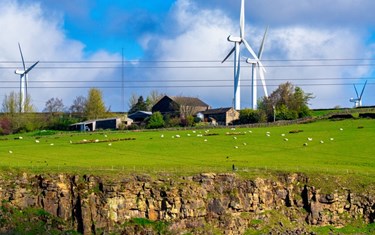Click here to read the Scottish Government's review document.

2.1 Domestic Renewables: Solar Energy Equipment
1) Do you agree with the proposed permitted development rights for solar panels attached to domestic properties in Conservation Areas?
Yes
Please comment in support of your answer:
We broadly support this proposal. However, we would recommend caution in applying blanket conditions, particularly with respect to nominating elevations to which this PDR should (and should not) be applied. The question of which elevations are considered to be primary or secondary can be a matter of debate and discussion, as can the question of which elevation(s) of a property contribute to the special character of a conservation area.
Whilst RTPI Scotland supports proposals that will help to facilitate Scotland’s journey to net zero, and we recognise that PDRs can do this by reducing unnecessary burdens on the planning system, we believe that caution should be applied when extending PDRs to ensure we do not adopt an attitude that they are the silver bullet to achieving our net zero goals, particularly having regard to the current pressures facing the planning system. A well-resourced and skilled planning service which functions in accordance with the Place Principle is the only way to ensure Scotland is ready and capable of achieving its net zero targets. Using PDRs as a ‘quick fix’ approach to achieving net zero ignores, and has the potential to exacerbate, the wider challenges currently affecting Scotland’s planning system with respect to resourcing and training pressures. It also risks community backlash against the infrastructure we need for net zero because people had no means of influencing decision making when it was deployed.
2) Do you agree with the proposed permitted development rights for the installation of solar panels on outbuildings ancillary to, and within the curtilage of a dwellinghouse?
Yes
Please comment in support of your answer:
No further comment.
2.2 Domestic Renewables: Air Source Heat Pumps
3) Do you agree with the proposed amendments to permitted development rights for Air Source Heat Pumps?
Yes
Please comment in support of your answer:
We support this proposal in principle.
Air source heat pumps (ASHP) are a low carbon technology that extract heat energy from the air to warm houses and provide hot water. RTPI Scotland supports proposals to make it easier for householders and businesses to install renewable technologies. This is a positive step on the path towards making our energy supply more secure and less carbon-intensive and micro-renewables such as ASHPs have an important role to play. Also, the visibility of micro renewables within the urban environment will also raise awareness of the need to diversify our energy sources and energy use. However, caution should be applied to this PDR in flatted developments as we are aware that planning authorities have observed cumulative background noise impacts related to the installation of ASHPs.
2.3 Domestic Renewables: Ground and water source heat pumps
4) Do you agree that classes 6D and 6E should be amended to include reference to the installation etc. of pipework and associated connections required to operate a ground or water source heat pump?
Yes
Please comment in support of your answer:
This appears to be a clarification amendment to ensure the intent of the existing PDR is made clear and to bring it in line with other PDRs relating to non-domestic ground source and water source heat pumps where this distinction is made.
It is in the interests of achieving our net zero targets to ensure that the tools we use to do this are clear and concise and to remove any likelihood of them being misinterpreted or causing confusion. Consequently, RTPI Scotland supports this proposal.
2.4 Domestic Renewables: Free-standing wind turbines
5) Do you agree with the proposed amendments to permitted development rights for free-standing domestic wind turbines?
No
Please comment in support of your answer:
Whilst RTPI Scotland is not against installation of these technologies in principle, care does need to be taken in their siting. There needs to be control regarding the cumulative impact of numerous installations in any particular area, especially with regard to visual impact, noise impact and impact on wildlife. Also, maintenance is essential to keep turbine noise at agreed levels. We would welcome encouragement of community schemes wherever possible to reduce the amount of hardware required and its appropriate setting within a locality.
More generally, we would like to reiterate that RTPI Scotland broadly support proposals that will help to facilitate Scotland’s net zero journey. Although we recognise that PDRs can assist in this by reducing unnecessary burdens on the planning system, we believe that PDRs should only be extended where they contribute to the overall purpose of planning as introduced by the Planning (Scotland) Act 2019 – i.e. “to manage the development and use of land in the long term public interest”. This includes ensuring that permitted development does not impinge upon communities’ collective rights and abilities to influence the delivery of our net zero targets. We therefore recommend that caution be administered in extending PDRs, and that we do not adopt an attitude that extending PDRs is the silver bullet to achieve our net zero goals. A well resourced and skilled planning service which functions in accordance with the Place Principle is the only way to ensure Scotland is ready and capable of achieving its net zero targets. Using PDRs as a ‘quick fix’ approach to achieving net zero ignores, and has the potential to exacerbate, the wider issues currently affecting Scotland’s planning system with respect to resourcing and training pressures. It also risks community backlash against the infrastructure we need for net zero because people had no means of influencing decision making when it was deployed.
6) Do you agree with the current list of designated areas where the permitted development rights do not apply, noting that the list does not currently include national parks or National Scenic Areas?
Don't know
Please comment in support of your answer:
No comment
2.5 Domestic Renewables: Wind turbines attached to a dwelling
7) Do you agree with the proposed new permitted development rights for wall or roof-mounted wind turbines attached to a dwellinghouse?
Yes
Please comment in support of your answer:
RTPI Scotland is broadly supportive of this proposal. We would, however, reiterate our comments under Question 5 of this consultation.
2.6 Domestic Renewables: Flues for certain heating systems
8) Do you have any comments on the potential removal of permitted development rights for flues for wood burning stoves (including wood burners and log burners), biomass boilers and biomass heating systems?
No
Please comment in support of your answer
No comment
9) Noting that the current permitted development rights (PDR) cover the installation, alteration or replacement of flues, should any removal of these PDR be limited to installation of new flues, or also prevent existing flues being altered or replaced under PDR?
Please comment:
The removal of this PDR should be limited to the installation of new flues
3.1 Non-Domestic Renewables: Solar Panels
10) Do you agree with the proposed amendments to class 6J permitted development rights for solar panels attached to non-domestic buildings?
Yes
Please comment in support of your answer:
No further comment
11) Do you have any comments on the potential to amend the current restrictions that apply to solar panels on non-domestic properties (class 6) and solar canopies in parking areas (class 9M) within 3km of airports and technical sites associated with civilian and military air traffic services?
No
Please comment in support of your answer:
No comment
12) Do you agree with the proposed new permitted development rights for solar panels within the curtilage of non-domestic buildings?
Yes
Please comment in support of your answer:
No further comments
3.2 Non-Domestic Renewables: Solar canopies in parking areas
13) Do you agree with the proposal to extend the Class 9M permitted development rights to allow these to apply to solar canopies generally, rather than only those for which the primary use is charging of electric vehicle?
Yes
Please comment in support of your answer:
No further comment
14) Do you agree that any extension of Class 9M permitted development rights to be for the purposes of producing electric power generally, should not have a maximum power generation capacity?
Yes
Please comment in support of your answer:
No further comment
3.3 Non-Domestic Renewables: Air Source Heat Pumps
15) Do you agree with the proposed permitted developments rights for air source heat pumps on non-domestic buildings?
Yes
Please comment in support of your answer:
No further comments
3.4 Non-Domestic Renewables: Ground source and water source heat pumps
16) Do you agree with our proposed amendments to class 6I permitted development rights for ground and water source heat pumps on non-domestic buildings?
Yes
Please comment in support of your answer:
We understand that this is an amendment to clarify the intention of this PDR.
It is in the interests of achieving our net zero targets to ensure that the tools we use to do this are clear and concise and to remove any likelihood of them being misinterpreted or causing confusion. Consequently, RPTI Scotland supports this proposal.
4 Thermal Efficiency: Replacement windows
17) Do you agree with the proposed permitted development rights for replacement windows of domestic buildings located in conservation areas?
Yes
Please comment in support of your answer:
We broadly support this proposal
18) Do you have any comments on the conditions that we propose the permitted development rights for replacement windows would be subject to?
Yes
Please comment in support of your answer
We broadly support these proposals. However, we would like to note that these conditions may not achieve application of a nuanced approach advocated for in paragraph 4.2.11 of the consultation paper.
19) Do you agree with the proposal to align non-domestic buildings with domestic buildings, as regards permitted development rights for replacement windows? Are there any types of non-domestic building that should be excluded?
Yes
Please comment in support of your answer
No further comments
5.1 Electricity Undertakings: Overview
20) Do you agree that class 40 permitted development rights should be amended to clarify that they can be applied to statutory undertakers for the purposes of 'smart meter communications' and the 'distribution' and 'interconnection' of electricity as well as its 'generation', 'transmission' and 'supply'?
Don't know
Please comment in support of your answer:
No further comments
5.4 Electricity Undertakings: Substation infrastructure
21) Do you agree with the proposed amendments to the provisions of class 40 permitted development rights which relate to new or replacement substations?
Don't know
Please comment in support of your answer:
No further comments
5.5 Electricity Undertakings: Communications Lines
22) Do you agree with the proposal to allow the replacement of communications lines in National Scenic Areas and Sites of Special Scientific Interest under class 40 permitted development rights provided that the design, height or position of the replacement line matches the original?
Yes
Please comment in support of your answer:
No further comments
23) Do you have any thoughts on the potential to provide for the installation or replacement of communications lines of a greater length than 1,000, under class 40? If so, do you have a view on an appropriate alternative threshold?
No
Please comment in support of your answer:
No further comment
5.6 Electricity Undertakings: Site Investigation Works
24) Do you agree with the proposal to extend the range of site investigation works that can be carried out under class 40?
Don't know
Please comment in support of your answer:
No further comments.
25) Do you consider that there any are designated areas where permitted development rights for certain site investigation works should be restricted? Should there be any limitations on the scale of certain intrusive site investigation works permitted, for example, the size of trial pits?
Don't know
Please comment:
No further comments
5.7 Electricity Undertakings: Fences, gates, walls and other means of enclosures
26) Do you agree with the proposed introduction of specific permitted development rights enabling electricity undertakers to erect, construct, maintain or improve gates, fences, walls or other means of enclosure up to 3m in height?
Yes
Please comment in support of your answer:
No further comments.
5.8 Electricity Undertakings: Development of Operational Land
27) Do you agree with the proposed removal of prior approval requirements that apply to certain works under class 40 permitted development rights?
Yes
Please comment in support of your answer:
No further comments
28) Please provide any further views you may have on the proposals in Chapter 5 on the permitted development rights associated with electricity undertakings.
Please comment:
No further comments.
6.1 Reverse vending machines
29) Do you agree with the proposed amendments to permitted development rights for reverse vending machines
No
Please comment in support of your answer:
We understand the reasoning behind the introduction of this PDR. We would note, however, that it is not just the accumulation of RVMs that could contribute to street clutter. RVMs within close proximity to other street furniture and infrastructure, including benches, bins, retail pavement signs etc. can also cause the accumulation of street clutter. Whilst we are broadly supportive of proposals that will make it easier to install reverse vending machines to encourage increased levels of recycling of drinks containers and reduce the amount of litter and waste, we would recommend caution be applied to the introduction of any PDR which could cause increased obstructions for pedestrians, particularly having regard to the size proposed to be permitted under this PDR. This is particularly the case for RVMs which could result in further obstructions caused by people queuing to use them.
RTPI Scotland supports proposals that will help to facilitate Scotland’s net zero journey. Although we recognise that PDRs can assist in this by reducing unnecessary burdens on the planning system, we believe that PDRs should only be extended where they contribute to the overall purpose of planning as introduced by the Planning (Scotland) Act 2019 – i.e. “to manage the development and use of land in the long term public interest”. This includes ensuring that permitted development does not impinge upon communities’ collective rights and abilities to influence the delivery of our net zero targets. We therefore recommend that caution be administered in extending PDRs, and that we do not adopt an attitude that extending PDRs is the silver bullet to achieve our net zero goals. A well resourced and skilled planning service which functions in accordance with the Place Principle is the only way to ensure Scotland is ready and capable of achieving its net zero targets. Using PDRs as a ‘quick fix’ approach to achieving net zero ignores, and has the potential to exacerbate, the wider issues currently affecting Scotland’s planning system with respect to resourcing and training pressures. It also risks community backlash against the infrastructure we need for net zero because people had no means of influencing decision making when it was deployed.
6.2 Temporary use of land: Shooting ranges
30) Do you have any comments on the potential exclusion of the use of land as a target shooting range from class 15 PDR (permitted development right)? If such a change were taken forward, do you have views on the potential justification for exempting the activities discussed in paragraphs 6.2.4 and 6.2.5?
Don't know
Please comment:
No further comments
7 Assessment of Impacts
31) What are your views on the findings of the update to the 2019 Sustainability Appraisal Report at Annex A?
Please comment:
No comment.
32) Do you have any comments on the partial and draft impact assessments undertaken for Phase 3?
Yes
Please comments:
RTPI Scotland understands that the increase in PDR is intended to reduce burdens on planning authorities, allowing them to focus resources on more strategically important and complex cases. However, the resulting reduction in applications would lead to a reduction in planning fee income for planning authorities. An estimation should be undertaken to ascertain how much income could be lost and any potential impacts this could have on planning services.
33) Do you have any suggestions for additional sources of information on the potential impacts of the proposals that could help inform our final assessments?
Yes
Please comment:
We would like to take this opportunity to reiterate that RTPI Scotland broadly support proposals that will help to facilitate Scotland’s net zero journey. Although we recognise that PDRs can assist in this by reducing unnecessary burdens on the planning system, we believe that PDRs should only be extended where they contribute to the overall purpose of planning as introduced by the Planning (Scotland) Act 2019 – i.e. “to manage the development and use of land in the long term public interest”. This includes ensuring that permitted development does not impinge upon communities’ collective rights and abilities to influence the delivery of our net zero targets. We therefore recommend that caution be administered in extending PDRs, and that we do not adopt an attitude that extending PDRs is the silver bullet to achieve our net zero goals. A well resourced and skilled planning service which functions in accordance with the Place Principle is the only way to ensure Scotland is ready and capable of achieving its net zero targets. Using PDRs as a ‘quick fix’ approach to achieving net zero ignores, and has the potential to exacerbate, the wider issues currently affecting Scotland’s planning system with respect to resourcing and training pressures. It also risks community backlash against the infrastructure we need for net zero because people had no means of influencing decision making when it was deployed.


